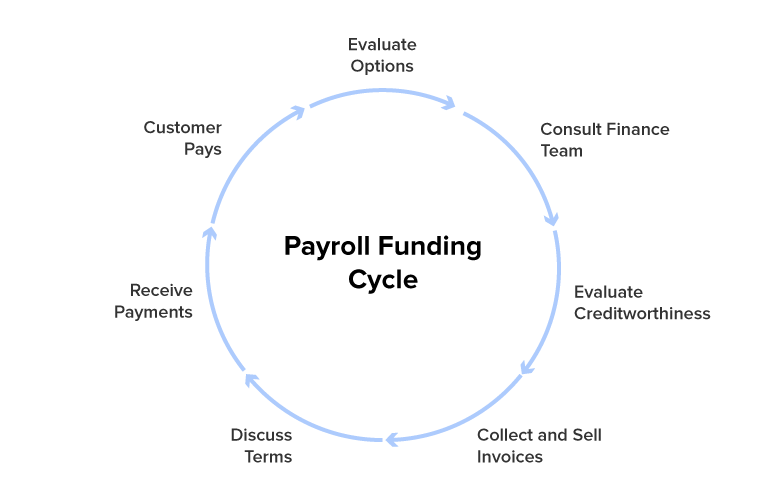What is Payroll Funding?

Table of Contents
Nearly all businesses face challenges related to cash flow management at some stage of their growth cycle. In such cases, payroll funding could be a viable option. So, payroll financing can be considered as one of the important financial tools.
This is so because it can address several challenges related to cash flow management. Payroll financing ensures that you are able to pay employees on time and subsequently helps you in complying with labor regulations. Relying on invoice factoring services could also help you in dealing with higher turnover, as timely compensation makes employees feel secure.
At times, you might not have enough liquid capital due to delays in customer payments. In such times, payroll funding can also facilitate seamless business operations by helping you get cash from service providers.
This blog explains the importance of payroll funding in addressing the challenges related to payroll financing and examines the benefits of invoice factoring in detail.

What is Payroll Funding?
Payroll funding, also known as payroll financing, is a financial service that provides immediate funds to businesses to cover their payroll expenses. It is a form of advanced payment in which a payroll funding company provides funds to an organization against its outstanding invoices for paying its employees. Organizations should remember that payroll financing is not a loan, as it is not considered a debt or liability.
A payroll funding company can be independent or bank-affiliated. A bank-affiliated provider is comparatively more regulated than an independent provider. An organization could be a startup, a large enterprise, or a recruitment agency. Any organization can rely on a payroll funding facility for making timely payments to employees.
Why do Businesses Need Payroll Funding?
Here are 7 reasons why businesses need payroll funding:
- Seasonal fluctuations: Businesses that are heavily reliant on seasons might face inconsistencies in revenue.
- Delayed payments: Waiting for client payments can sometimes cause delays in paying employees. For example, a client may need 30-60 days to make payments, while an organization may require that money to pay their employees within 7-15 days.
- Rise in labor costs: In times of need, organizations must fill gaps on an urgent basis and may require immediate cash to hire new employees.
- Project-based payment cycles: In a project-based payment cycle, the client pays the full amount upon completion of the project.
- Failure in financial forecasting: There are two possible reasons why firms fail to forecast future cash needs:
- Issues in payroll reporting. The issues could be related to inaccuracy or incompleteness.
- Lack of proper records. Manual payroll processes could make it harder for you to maintain records.
- Policy-related issues: You may face policy-related challenges, such as difficulties in complying with regulations. For example, the Payment of Wages Act (1936) and other employee regulations specify the time duration within which an employer is supposed to compensate employees.
- Issues related to retention and turnover: Employees could leave your organisation due to untimely payments, as they would find it harder to manage their budget due to a lack of timely payments.

What are the Benefits of Payroll Funding?
Here are some of the key benefits of payroll funding:
- Solves cash flow issues,
- Ensures timely salary payments,
- Maintains employee retention, and
- Flexible and scalable with business growth.
Solves Cash Flow Issues
It helps solve cash flow issues, like inconsistent revenues, by providing payments against the invoices of an organization. For example, businesses can avail payments against an invoice from a client who has paid 20% of the total amount in advance and will pay the full payment after the completion of the project.
Ensures Timely Salary Payments
Payroll funding helps in paying employees on time. Timely payments are necessary for two reasons –
1. Many regulations stipulate the time for compensating employees on time, and
2. Processing salary on time would be helpful for you while anticipating future cash needs, as you would be able to prepare payroll-related reports and make decisions promptly if needed.
Maintains Employee Trust and Retention
Retaining employees is one of the top priorities of any organization. A lack of timely payments can lead to lower retention rates and increased labor costs. A PWC survey states that 77% of employees consider fair pay important for building trust. This figure highlights the importance of fair and timely employee compensation.
Flexible and Scalable with Business Growth
Payroll financing is suitable for businesses of all sizes. Small or medium-sized businesses can rely on payroll funding for effectively processing payroll.
How does Payroll Funding Work? (Step-by-Step)
Here is an overview of the general steps involved in payroll financing:

- Evaluating the available options: Organizations should consider their options before selecting a payroll funding company, for example, bank-affiliated providers.
- Consult the finance team: A company’s finance team can give an idea of current and future estimation.
- Evaluate the creditworthiness of the client: Organizations should remember that any provider will evaluate the creditworthiness of their clients. So, it is essential to have clients with reliable financial conditions.
- Collect and sell invoices: The next step is to collect invoices from clients and sell them to a payroll funding company.
- Discuss terms and conditions: It is important to understand various terms and conditions to avoid hidden costs during or after the process.
- Receive payments: In this step, companies receive payments ranging from 80% to 100% of the total amount, based on terms and conditions.
- The customer would pay the payment: This is the final step, where the customer pays the payment to the funding company, and the organization receives the remaining 10-20% of its margin.

Final Thoughts
Payroll funding is vital for businesses. It helps avoid common cash flow management challenges and retains employees by providing funds for timely payments.
Payroll financing could be relied on to solve short-term challenges, but it is not a viable long-term solution for managing payroll.
**Note: This blog is only for informational purposes. Consult your finance and payroll teams before making any decision regarding payroll funding.
Grow your business with factoHR today
Focus on the significant decision-making tasks, transfer all your common repetitive HR tasks to factoHR and see the things falling into their place.

© 2026 Copyright factoHR


